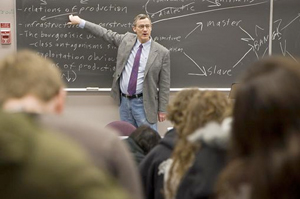 World Teachers’ Day has just been celebrated last Sunday, 5 October. The day is dedicated to honouring the teachers around the world for their contribution to people’s lives and the society in a greater sense. In schools, students express their gratitude to their teachers. In the bigger world outside, people also look back and thank their teachers, even just in their mind.
World Teachers’ Day has just been celebrated last Sunday, 5 October. The day is dedicated to honouring the teachers around the world for their contribution to people’s lives and the society in a greater sense. In schools, students express their gratitude to their teachers. In the bigger world outside, people also look back and thank their teachers, even just in their mind.
The thank you lists include college professors. Those who come to mind are the best teachers. The rest are forgotten by most people. However, we should remember that teachers endure hardships as they play a relevant role in our lives. Being effective in their vocation is one such big struggle. Really, it is not easy being an effective teacher. This is one fact that can be verified from the works of Professor Graham Gibbs.
A Lifelong Work
Teachers’ day or not, Prof Gibbs thinks of teachers and their welfare, particularly how they can be helped in becoming effective. This is one half of his twin missions; the other being how to improve student learning. He has dedicated his academic career to the cause of improving teaching and learning in higher education. Just this week, the Times Higher Education published his essay article “Teaching training: take the short cut to better results” where he demonstrates how better designed training schemes for teachers can help improve student learning.
A Long-Running Issue
Prof Gibbs illustrates why lecturers should be required to have formal teacher training, an issue he relates to have been subject of much debate in recent years. He cites that the 2010 Browne review recommended that teacher training should be an important factor when awarding universities some public funding. He adds that there have also been demands to include a university’s proportion of trained teachers in the Key Information Sets for students.
What we can learn from Prof Gibbs’ essay is that the advancement of higher education is slow because many, if not most, lecturers are not properly trained. Such lack in training contributes to poor student learning. Then, we hear many employers say they need to train the graduates they hire because their education has not really prepared them for work.
The Needed Shortcut
Content of teacher training materials should include the experiences and wisdom of teachers who were already there and have become successful, Prof Gibbs point out. He asserts that for higher education to get better results fast, such training should be put into place. We can learn from his essay that it took some time for teachers to become truly effective in causing student learning. Most of the successful teachers are in the more advances stages of their careers and their lives. They had to go through years of being ineffective before becoming effective. In the process, they were producing students and graduates with insufficient learning.
Learning from Past
Teachers both new and not so new should be trained on the right mindset so that they can perform their function of causing learning in students well. Prof Gibbs cites that postgraduate teaching assistants can be distracted from what should be taught and how it should be done because they may be preoccupied with whether students like them or are impressed by them, and whether they can get away with passing themselves off as an academic in their discipline.
More so, they need training on how to determine the right content and method of their teaching. Citing evidence, Prof Gibbs says that teachers who have undergone training programmes got better ratings from students.
It is only after being concerned of impressing students and, then, the instruction content and method that teachers advance into pondering on their effectiveness in teaching or student learning. This is where the truly essential question of whether they have had an impact on their students come in.
Prof Gibbs asserts that teachers should be trained on how to develop ways of explaining the subject matter in which students can truly understand and also knowing how they might misunderstand it. Further, new teachers should be provided with career support so that they can be effective.
The Whole Point
The skid should be arrested and it can be done by eliminating the stage wherein teachers and lecturers “waste” the time figuring out what really needs to be done and how to do things the right way. They should be given a training scheme. One that is well designed and well-funded. This way, they will be able to the right things and do things right, the first time. This will expedite the process of churning out students and graduates who are well-learned and readily prepared for employment.
Have you observed any of the findings relating to teacher effectiveness and student learning pointed out by Prof Gibbs in his essay? Can you think of more possible solutions to the mentioned main problems and any problem you might have added to the discussion?
 English
English 中文
中文
